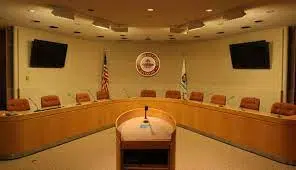Council studies code enforcement, Neighborhood Revitalization
Decatur, IL – The Decatur City Council met for the first time in 2023 to conduct a study session on code enforcement strategies and Neighborhood Revitalization initiatives. Below are highlights from the meeting. No official action was taken by Council during the study session.
Code Enforcement
A majority of the study session was spent discussing the City’s code enforcement strategy. City staff and the Council has recognized that the City cannot reasonably achieve its neighborhood revitalization objectives without significantly scaling up code enforcement, revising trash collection and rubbish handling rules, and partnering better with landlords and property owners. As such, the City commissioned a report from the Center for Community Progress (CCP) focusing on new code enforcement strategies, which was reviewed Monday night.
CCP’s presentation included possible revisions, additions, and suggestions that would support Neighborhood Revitalization. Council asked that staff continue work on the following suggestions:
– Amending Chapter 49 regarding garbage, junk, and trash removal: This would expand the 72-hour notice to include other abandoned items that are health hazards, as well as trash & debris.
– Rental Registration Ordinance: An ordinance requiring landlords to acquire an annual license and register each residential rental property. Council asked if this could be achieved with information already known by the City, such as when water service is started/transferred. Rental properties with multiple code violations over a certain period of time could be subject to an inspection. The City would create an inspection guide to ensure an equitable, efficient, and effective inspection process.
– Vacant Property Registration: A registration of vacant properties with the City, designating a local property manager for service and emergencies. It would require the following of property maintenance standards. This would benefit first responders in knowing if a structure is occupied or is not inhabited, should there be an emergency at that property.
– Chronic Nuisance Ordinance: An ordinance that defines repetitive behavior that creates a public nuisance. It would also create an enforcement mechanism to help deal with this behavior.
– Seeking Special State Legislation: Staff would seek changes to the state property tax system which currently contributes to our vacant and abandoned property problem. Staff would also seek a state law helping define land banks, giving them more legal clarity.
– Changing Selected Trash Collection Rules: Council briefly discussed changes to end-alley collections and options for a uniform cart/container.
The CCP report includes much more than just these suggested changes. It calls for better communication to help residents and landowners understand local ordinances, along with other enforcement techniques aside from fines and fees. The City will share more information from the report if/when the above suggested changes come before Council in future meetings.
Neighborhood Revitalization update
Also on Monday night, the Council reviewed a progress report on Neighborhood Revitalization initiatives from 2019 to 2022. The City is undertaking multiple initiatives to help improve our neighborhoods, but efforts are generally broken down into three main categories: demolitions, rehabilitation, and catalyst projects.
– Demolitions: 156 demolitions have been completed in the urban core between 2019 and 2022. As a result, 14 of the 18 urban core neighborhoods have an improved existing structure condition score. One neighborhood was not surveyed in 2019, and only 2 total demolitions occurred in the neighborhoods where the scores worsened.
– Rehabilitation: Council also received an update on numerous rehabilitation programs led by the City’s Economic & Community Development Department. Programs like the Owner-Occupied Residential Rehab Program, Small Home Improvement Program (SHIP), Landlord Loan Program, Clean-Up Green-Up, and side lot sales all contributed to improved scores in the City’s urban core. Many more programs/initiatives are in the works that will roll out soon.
– Catalyst Projects: City staff continues to work on projects that could jump-start more investment/development and rehabilitation in certain neighborhoods. We continue to work with developers on the Old Garfield School and adjacent properties. Projects continue in the Johns Hill Neighborhood school/park area. Negotiations are ongoing with IDOT and other entities for the Business 51 transportation corridor. And the Great Streets, Great Neighborhoods project in the Jasper Street corridor is on target as well.
In part because of these efforts, data shows that Equalized Assessed Value (EAV) has risen in 15 of the 18 urban core neighborhoods between 2019 and 2022. In general, much of the data presented showed improvement in most of Decatur’s neighborhoods over the last three years. Although the Council noted
there is much more work to be done, as a lot of projects will continue in 2023 and beyond.
Next steps
All options for new code enforcement, trash handling, and other initiatives were only discussion items Monday night. City staff will work out final details and some of the desired changes will be presented to Council in meetings later this year.
More information about the CCP code enforcement presentation and Neighborhood Revitalization data can be found in the City Council Study Session Agenda packet, downloadable/viewable here: www.decaturil.gov/mayor-and-council/council-meetings/











Comments